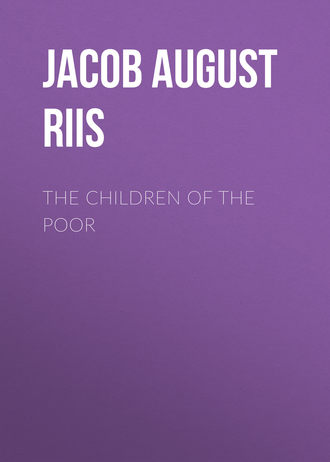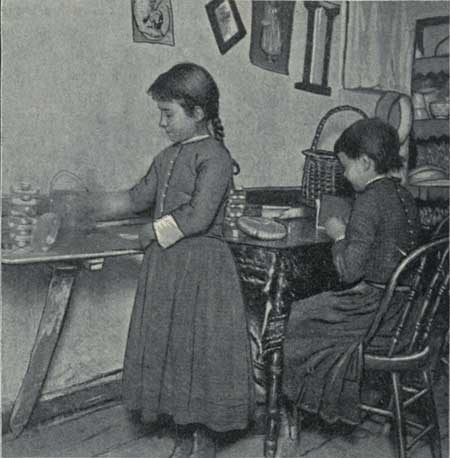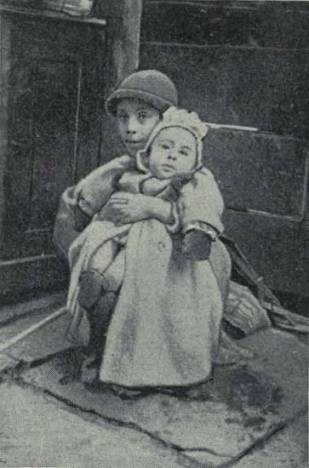 полная версия
полная версияThe Children of the Poor
The doctor’s observations throw a bright side-light upon the economic home conditions that lie at the root of this problem of child labor in the factories. With that I have not done. Taking the Factory Inspector’s report for 1890, the last at that time available, I found that in that year his deputies got around to 2,147 of the 11,000 workshops (the number given in the report) in the Second district, which is that portion of New York south of Twenty-third Street. In other words, they visited less than one-fifth of them all. They found 1,102 boys and 1,954 girls under sixteen at work; 3,485 boys under eighteen, and 12,701 girls under twenty-one, as nearly as I could make the footings. The figures alone are instructive, as showing the preponderance of girls in the shops. The report, speaking of the State as a whole, congratulates the community upon the alleged fact “that the policy of employing very young children in manufactories has been practically abolished.” It states that “since the enactment of the law the sentiment among employers has become nearly unanimous in favor of its stringent enforcement,” and that it “has had the further important effect of preventing newly arrived non-English speaking foreigners from forcing their children into factories before they learned the language of the country,” these being “now compelled to send their children to school, for a time at least, until they can qualify under the law.” Further, “the system of requiring sworn certificates, giving the name, date, and place of birth of all children under sixteen years of age … has resulted in causing parents to be very cautious about making untrue statements of the ages of their children.” The deputies “are aware of the various subterfuges which have been tried in order to evade the law and put children at labor before the legal time,” and the Factory Inspector is “happy to say that they are not often imposed upon by such tactics.”
Without wading through nearly seventy pages of small print it was not possible to glean from the report how many of the “under sixteen” workers were really under fourteen, or so adjudged. A summary of what has been accomplished since 1886 showed that 1,614 children under fourteen were discharged by the Inspector in the Second District in that time, and that 415 were discharged because they could not read or write simple sentences in the English language. The “number of working children who could not read and write English” was in 1890 alone 252, according to the report, or more than one-half of the whole number discharged in the four years, which does not look as if the law had had much effect in that way, at least in New York city. I determined to see for myself what were the facts.
I visited a number of factories, in a few instances accompanied by the deputy factory inspector, more frequently alone. Where it was difficult to gain admission I watched at the door when the employees were going to or coming from work, finding that on the whole the better plan, as affording a fairer view of the children and a better opportunity to judge of their age than when they sat at their work-benches. I found many shops in which there were scarcely any children, some from which they had been driven, so I was informed by the inspectors. But where manufacturers were willing to employ their labor—and this I believe to be quite generally the case where children’s labor can be made to pay—I found the age certificate serving as an excellent protection for the employer, never for the child. I found the law considered as a good joke by some conscienceless men, who hardly took the trouble to see that the certificates were filled out properly; loudly commended by others whom it enabled, at the expense of a little perjury in which they had no hand, to fill up their shops with cheap labor, with perfect security to themselves. The bookkeeper in an establishment of the conscienceless kind told me with glee how a boy who had been bounced there three times in one year, upon his return each time had presented a sworn certificate giving a different age. He was fifteen, sixteen, and seventeen years old upon the records of the shop, until the inspectors caught him one day and proved him only thirteen. I found boys at work, posing as seventeen, who had been so recorded in the same shop three full years, and were thirteen at most. As seventeen-year freaks they could have made more money in a dime museum than at the work-bench, only the museum would have required something more convincing than the certificate that satisfied the shop. Some of these boys were working at power-presses and doing other work beyond their years. An examination of their teeth often disproved their stories as to their age. It was not always possible to make this test, for the children seemed to see something funny in it, and laughed and giggled so, especially the girls, as to make it difficult to get a good look. Some of the girls, generally those with decayed teeth,9 would pout and refuse to show them. These were usually American girls, that is to say, they were born here. The greater number of the child-workers I questioned were foreigners, and our birth returns could have given no clue to them. The few natives were alert and on the defensive from the moment they divined my purpose. They easily defeated it by giving a false address.
I finally picked out a factory close to my office where Italian girls were employed in large numbers, and made it my business to ascertain the real ages of the children. They seemed to me, going and coming, to average twelve or thirteen years. The year before the factory inspector had reported that nearly a hundred girls “under sixteen” were employed there. She had discharged sixty of them as unable to read or write English. I went to see the manufacturers. They were not disposed to help me and fell back on their certificates—no child was employed by them without one—until I told them that my purpose was not to interfere with their business but to prove that a birth-certificate was the only proper warrant for employment of child-labor.
“Why,” said the manufacturer, in his astonishment forgetting that he had just told me his children were all of age, “my dear sir! would you throw them all out of work?”
It was what I expected. I found out eventually that a number of the children attended the evening classes in the Leonard Street Italian School, and there one rainy night I corralled twenty-three of them, all but one officially certified under oath to be fourteen or sixteen. But for the rain I might have found twice the number. The twenty-three I polled, comparing their sworn age with the entry in the school register, which the teachers knew to be correct. This was the result: one was eleven years old and had worked in the factory a year; one, also eleven, had just been engaged and was going for her certificate that night; three were twelve years old, and had worked in the factory from one month to a year; seven were thirteen, and of them three had worked in the shop two years, the others one; nine were fourteen; one of them had been there three years, four others two years, the rest shorter terms; one was fifteen and had worked in the factory three years; the last and tallest was sixteen and had been employed in the one shop four years. She said with a laugh that she had a “certificate of sixteen” when she first went there. Not one of them all was of legal age when she went to work in the shop, under the warrant of her parents’ oath. The majority were not even then legally employed, since of those who had passed fourteen there were several who could not read simple sentences in English intelligibly; yet they had been at work in the factory for months and years. One of the eleven-year workers, who felt insulted somehow, said spitefully that “I needn’t bother, there was lots of other girls in the shop younger than she.” I have no doubt she was right. I should add that the firm was a highly respectable one, and its members of excellent social standing.
I learned incidentally where the convenient certificates came from, at least those that were current in that school. They were issued, the children said, free of charge, by a benevolent undertaker in the ward. I thought at first that it was a bid for business, or real helpfulness. The neighborhood undertaker is often found figuring suggestively as the nearest friend of the poor in his street, when they are in trouble. But I found out afterward that it was politics combined with business. The undertaker was an Irishman and an active organizer of his district. Unpolitical notaries charged twenty-five cents for each certificate. This one made them out for nothing. All they had to do was to call for them. The girls laughed scornfully at the idea of there being anything wrong in the transaction. Their parents swore in a good cause. They needed the money. The end conveniently justified the means in their case. Besides “they merely had to touch the pen.” Evidently, any argument in favor of education could scarcely be expected to have effect upon parents who thus found in their own ignorance a valid defence against an accusing conscience as well as a source of added revenue.
My experience satisfied me that the factory law has had little effect in prohibiting child labor in the factories of New York City, although it may have had some in stimulating attendance at the night schools. The census figures, when they appear, will be able to throw no valuable light on the subject. The certificate lie naturally obstructs the census as it does the factory law. The one thing that is made perfectly clear by even such limited inquiry as I have been able to make, is that a birth certificate should be substituted for the present sworn warrant, if it is intended to make a serious business of the prohibition. In the piles upon piles of these which I saw, I never came across one copy of the birth registry. There are two obstacles to such a change. One is that our birth returns are at present incomplete; the other, that most of the children are not born here. Concerning the first, the Registrar of Vital Statistics estimates that he is registering nearly or quite a thousand births a month less than actually occur in New York; but even that is a great improvement upon the record of a few years ago. The registered birthrate is increasing year by year, and experience has shown that a determination on the part of the Board of Health to prosecute doctors and midwives who neglect their duty brings it up with a rush many hundreds in a few weeks. A wholesome strictness at the Health Office on this point would in a short time make it a reliable guide for the Factory Inspector in the enforcement of the law. The other objection is less serious than it appears at first sight. Immigrants might be required to provide birth certificates from their old homes, where their children are sure to be registered under the stringent laws of European governments. But as a matter of fact that would not often be necessary. They all have passports in which the name and ages of their children are set down. The claim that they had purposely registered them as younger to cheapen transportation, which they would be sure to make, need not be considered seriously. One lie is as good and as easy as another.
Another lesson we may learn with advantage from some old-country governments, which we are apt to look down upon as “slow,” is to punish the parents for the truancy of their children, whether they are found running in the street or working in a shop when they should have been at school. Greed, the natural child of poverty, often has as much to do with it as real need. In the case of the Italians and the Jewish girls it is the inevitable marriage-portion, without which they would stand little chance of getting a husband, that dictates the sacrifice. One little one of twelve in a class in the Leonard Street School, who had been working on coats in a sweat-shop nine months, and had become expert enough to earn three dollars a week, told me that she had $200 in bank, and that her sister, also a worker, was as forehanded. Their teacher supported her story. But often a meaner motive than the desire to put money in bank forges the child’s fetters. I came across a little girl in an East Side factory who pleaded so pitifully that she had to work, and looked so poor and wan, that I went to her home to see what it was like. It was on the top floor of a towering tenement. The mother, a decent German woman, was sewing at the window, doing her share, while at the table her husband, a big, lazy lout who weighed two hundred pounds if he weighed one, lolled over a game of checkers with another vagabond like himself. A half-empty beer-growler stood between them. The contrast between that pitiful child hard at work in the shop, and the big loafer taking his ease, was enough to make anybody lose patience, and I gave him the piece of my mind he so richly deserved. But it rolled off him as water rolls off a duck. He merely ducked his head, shifted his bare feet under the table, and told his crony to go on with the play.
It is only when the child rebels in desperation against such atrocious cruelty and takes to the street as his only refuge, that his tyrant hands him over to the justice so long denied him. Then the school comes as an avenger, not as a friend, to the friendless lad, and it is scarcely to be wondered at if behind his prison-bars he fails to make sense of the justice of a world that locks him up and lets his persecutor go free—likely enough applauds him for his public spirit in doing what he did. When the child ceases to be a source of income because he will not work, and has to be supported, at the odd intervals at least when he comes back from the street, the father surrenders him as a truant and incorrigible. A large number of the children that are every year sent to the Juvenile Asylum are admitted in that way. The real animus of it crops out when it is proposed to put the little prisoner in a way of growing up a useful citizen by sending him to a home out of the reach of his grasping relatives. Then follows a struggle for the possession of the child that would make the uninitiated onlooker think a gross outrage was about to be perpetrated on a fond parent. The experienced Superintendent of the Asylum, who has fought many such fights to a successful end, knows better. “In a majority of these cases,” he remarks in his report for last year, “the opposition is due, not to any special interest in the child’s welfare, but to self-interest, the relative wishing to obtain a situation for the boy in order to get his weekly wages.”
Little Susie, whose picture I took while she was pasting linen on tin covers for pocket-flasks—one of the hundred odd trades, wholly impossible of classification, one meets with in the tenements of the poor—with hands so deft and swift that even the flash could not catch her moving arm, but lost it altogether, is a type of the tenement-house children whose work begins early and ends late. Her shop is her home. Every morning she drags down to her Cherry Street court heavy bundles of the little tin boxes, much too heavy for her twelve years, and when she has finished running errands and earning a few pennies that way, takes her place at the bench and pastes two hundred before it is time for evening school. Then she has earned sixty cents—“more than mother,” she says with a smile. “Mother” has been finishing “knee-pants” for a sweater, at a cent and a-quarter a pair for turning up and hemming the bottom and sewing buttons on; but she cannot make more than two and a-half dozen a day, with the baby to look after besides. The husband, a lazy, good-natured Italian, who “does not love work well,” in the patient language of the housekeeper, had been out of a job, when I last saw him, three months, and there was no prospect of his getting one again soon, certainly not so long as the agent did not press for the rent long due. That was Susie’s doings, too, though he didn’t know it. Her sunny smile made everyone and everything, even in that dark alley, gentler, more considerate, when she was around.

LITTLE SUSIE AT HER WORK.
Of Susie’s hundred little companions in the alley—playmates they could scarcely be called—some made artificial flowers, some paper-boxes, while the boys earned money at “shinin’” or selling newspapers. The smaller girls “minded the baby,” so leaving the mother free to work. Most of them did something toward earning the family living, young as they were. The rest did all the mischief. The occupations that claim children’s labor in and out of the shop are almost as numberless as the youngsters that swarm in tenement neighborhoods. The poorer the tenements the more of them always. In an evening school class of nineteen boys and nine girls which I polled once I found twelve boys who “shined,” five who sold papers, one of thirteen years who by day was the devil in a printing-office, and one of twelve who worked in a wood-yard. Of the girls, one was thirteen and worked in a paper-box factory, two of twelve made paper lanterns, one twelve-year-old girl sewed coats in a sweat-shop, and one of the same age minded a push-cart every day. The four smallest girls were ten years old, and of them one worked for a sweater and “finished twenty-five coats yesterday,” she said with pride. She looked quite able to do a woman’s work. The three others minded the baby at home; one of them found time to help her mother sew coats when baby slept.
I have heard it said that the factory law has resulted in crowding the children under age into the stores, where they find employment as “cash” girls and boys, and have to fear only the truant officer, whose calls are as rare as angels’ visits. I do not believe this is true to any great extent. The more general employment of automatic carriers and other mechanical devices for doing the work once done by the children would alone tend to check such a movement, if it existed. The Secretary of the Working Women’s Society, who has made a study of the subject, estimates that there are five thousand children under fourteen years so employed all the year round. In the holiday season their number is much larger. Native-born children especially prefer this work, as the more genteel and less laborious than work in the factories. As a matter of fact it is, I think, much the hardest and the more objectionable of the two kinds, and not, as a rule, nearly as well paid. If the factory law does not drive the children from the workshops, it can at least punish the employer who exacts more than ten hours a day of them there, or denies them their legal dinner hour. In the store there is nothing to prevent their being worked fifteen and sixteen hours during the busy season. Few firms allow more than half an hour for lunch, some even less. The children cannot sit down when tired, and their miserable salaries of a dollar and a-half or two dollars a week are frequently so reduced by fines for tardiness as to leave them little or nothing. The sanitary surroundings are often most wretched. At best the dust-laden atmosphere of a large store, with the hundreds of feet tramping through it and the many pairs of lungs breathing the air over and over again, is most exhausting to a tender child. An hour spent in going through such a store tires many grown persons more than a whole day’s work at their accustomed tasks. These children spend their whole time there at the period when the growth of the body taxes all their strength.
An effort was made last year to extend the prohibition of the factory law to the stores, but it failed. It ought not to fail this winter, but if it is to be coupled with the sworn certificate, it were better to leave things as they are. The five thousand children under age are there now in defiance of one law that requires them to go to school. They lied to get their places. They will not hesitate to lie to keep them. The royal road is provided by the certificate plan. Beneficent undertakers will not be wanting to smooth the way for them.
There is still another kind of employment that absorbs many of the boys and ought to be prohibited with the utmost rigor of the law. I refer to the messenger service of the District Telegraph Companies especially. Anyone can see for himself how old some of these boys are who carry messages about the streets every day; but everybody cannot see the kind of houses they have to go to, the kind of people they meet, or the sort of influences that beset them hourly at an age when they are most easily impressed for good or bad. If that were possible, the line would be drawn against their employment rather at eighteen than at sixteen or fourteen. At present there is none except the fanciful line drawn against truancy, which, to a boy who has learned the tricks of the telegraph messenger, is very elastic indeed.

MINDING THE BABY.
To send the boys to school and see that they stay there until they have learned enough to at least vote intelligently when they grow up, is the bounden duty of the State—celebrated in theory but neglected in practice. If it did its duty much would have been gained, but even then the real kernel of this question of child labor would remain untouched. The trouble is not so much that the children have to work early as with the sort of work they have to do. It is, all of it, of a kind that leaves them, grown to manhood and womanhood, just where it found them, knowing no more, and therefore less, than when they began, and with the years that should have prepared them for life’s work gone in hopeless and profitless drudgery. How large a share of the responsibility for this failure is borne by the senseless and wicked tyranny of so-called organized labor, in denying to our own children a fair chance to learn honest trades, while letting foreign workmen in in shoals to crowd our market under the plea of the “solidarity of labor”—a policy that is in a fair way of losing to labor all the respect due it from our growing youth, I shall not here discuss. The general result was well put by a tireless worker in the cause of improving the condition of the poor, who said to me, “They are down on the scrub level; there you find them and have to put them to such use as you can. They don’t know anything else, and that is what makes it so hard to find work for them. Even when they go into a shop to sew, they come out mere machines, able to do only one thing, which is a small part of the whole they do not grasp. And thus, without the slightest training for the responsibilities of life, they marry and transmit their incapacity to another generation that is so much worse to start off with.” She spoke of the girls, but what she said fitted the boys just as well. The incapacity of the mother is no greater than the ignorance of the father in the mass of such unions. Ignorance and poverty are the natural heritage of the children.
I have in mind a typical family of that sort which our relief committee wrestled with a whole summer, in Poverty Gap. Suggestive location! The man found his natural level on the island, where we sent him first thing. The woman was decent and willing to work, and the girls young enough to train. But Mrs. Murphy did not get on. “She can’t even hold a flat-iron in her hand,” reported her first employer, indignantly. The children were sent to good places in the country, and repaid the kindness shown them by stealing and lying to cover up their thefts. They were not depraved; they were simply exhibiting the fruit of the only training they had ever received—that of the street. It was like undertaking a job of original creation to try to make anything decent or useful out of them.
I confess I had always laid the blame for this discouraging feature of the problem upon our general industrial development in a more or less vague way—steam, machinery, and all that sort of thing—until the other day I met a man who gave me another view of it altogether. He was a manufacturer of cheap clothing, a very intelligent and successful one at that; a large employer of cheap Hebrew labor and, heaven save the mark!—a Christian. His sincerity was unquestionable. He had no secrets to keep from me. He was in the business to make money, he said with perfect frankness, and one condition of his making money was, as he had had occasion to learn when he was himself a wage-worker and a union man, to keep his workmen where they were at his mercy. He had some four hundred hands, all Jewish immigrants, all working for the lowest wages for which he could hire them. Among them all there was not one tailor capable of making a whole garment. His policy was to keep them from learning. He saw to it that each one was kept at just one thing—sleeves, pockets, buttonholes—some small part of one garment, and never learned anything else.









